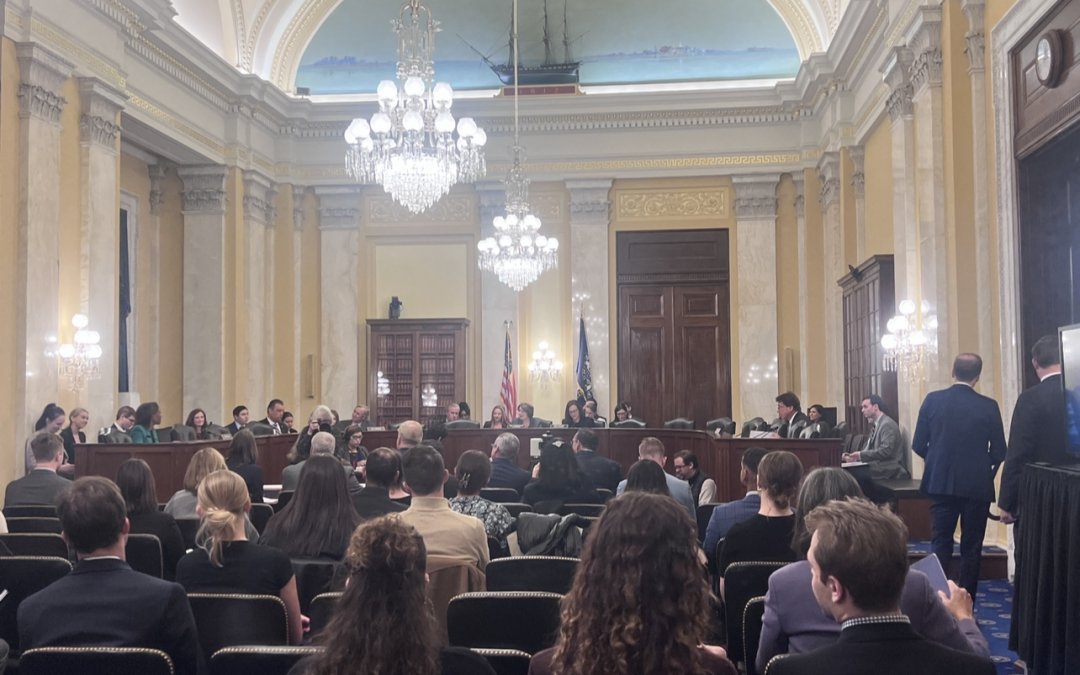WASHINGTON — Senators decried the increased violence and harassment that election officials have faced since the 2020 presidential election cycle and expressed further concern about decreasing faith in election administration across the country during a Committee on Rules and Administration hearing Wednesday.
Committee members sought solutions to these threats facing American democracy, consulting witnesses about ways to strengthen cybersecurity measures and increase protections for election volunteers and employees from violence and harassment.
Arizona Secretary of State Adrian Fontes emphasized the threat that election-based conspiracy theories and calls to action surrounding them pose to the strength of the American republic.
“This is a coordinated effort to undermine the democracy that upholds our republic,” Fontes said. “It is a coordinated national attack against democracy in America. It is an emergent authoritarianism. Some would even say, as I have said, it is an emergent method to move us toward fascism in this nation.”
After losing the 2020 general election, former President Donald J. Trump sowed doubt about the results by pushing a narrative widely dubbed as the Big Lie and calling on his loyalists to act upon purported “fraud,” which resulted in a violent mob storming the U.S. Capitol building on Jan. 6th, 2021.
Sen. Jon Ossoff, D-Ga., a longtime voting rights advocate and prodigy of American civil rights leader John Lewis, said voter fraud conspiracy theories perpetuated and widely dispersed by the former president have served as the basis for mass challenges to the eligibility of voters by independent partisan groups. He added that recent disenfranchisement has disproportionately affected Black Americans, especially in his home state of Georgia.
“The impact on the morale of the electorate, to know that there are private entities out there who are working day and night to undermine their access to the ballot, to challenge, effectively, their rights as a citizen, it’s demoralizing to the public and it occupies all of these election administration resources processing these frivolous attempts to disenfranchise people,” Ossoff said.
Fontes said his offices have, indeed, faced increased quantities of the analog DDoS attacks Ossoff described, which occur in the form of “frivolous complaints based on lies and conspiracies.” But, according to Fontes, the more frustrating obstacle has been the “overly voluminous and unnecessary public records requests” that have no end and are meant to send State Department officials on wild goose chases.
Sen. Katie Britt, R-Ala., who previously said she “believes that there was fraud” in the 2020 presidential election, focused her line of questioning on ensuring cybersecurity in elections. She commended Nebraska’s multi-factor authentication process, among other measures the state has taken to prevent hacking and fraud.
“Our response to cyber threats remains one of the most important issues that we must address in election administration and the security space,” Britt said.
Notably, Britt was one of only two Republican senators who questioned witnesses and one of only three such committee members to attend the hearing at all. Comparatively, all six Democratic senators who attended the hearing questioned the witnesses.
Britt suggested other states replicate cyber security measures used by the Nebraska State Department to ensure election security and fend off cyber attacks. However, Wayne Bena, the Nebraska Deputy Secretary of State for Elections, informed Britt that the steps Nebraska took to strengthen cybersecurity “aren’t anything new.” He added that every state had the opportunity to install Albert sensors and all fifty states did use them at some point.
Albert sensors are Intrusion Detection Systems that send alerts for known cybersecurity threats and help State Departments detect malicious threats to election administration.
Sen. Alex Padilla, D-Calif., who served as the Secretary of State in California before he was appointed to replace Vice President Kamala Harris as the state’s U.S. Senator in 2021 by Governor Gavin Newsom, offered to discuss Albert sensors with Sen. Britt “anytime.”
Padilla emphasized the importance of federal-state-local working relationships in ensuring the security of election administration and protecting voter registration databases. He said all it takes is one breach in one small county to “wreak havoc.”
“I can tell you, coming from a state that implemented [automatic voter registration], the most populous state with the most voters than any other state, it has done wonders for the accuracy of our voter rolls,” Padilla said.
According to Fontes, 12 out of 15 counties in Arizona have lost senior election officials since 2020. Schmidt also emphasized the impact losing senior election officials has had in Pennsylvania and the risk it poses to the strength of their election administration process.
In his questioning, Padilla expressed deep concern about the decreasing retention rates of election workers that many State Departments have experienced as increased threats and harassment of officials drive staff away.
Fontes, a former prosecutor, said the Department of Justice and local law enforcement agencies should have a “much more robust campaign” dedicated to investigating and prosecuting crimes that threaten the safety of election workers. He also called on the DOJ to use public promotion of successful prosecutions on these crimes as a deterrent.
“The reality is you don’t have a First Amendment right to threaten people just doing their jobs,” Fontes said. “If folks out there understand that this sort of behavior is criminal and will result in prosecution, then hopefully we can get a lot of that anti-American activity out of our civil society and get back to the notion of winners winning and losers trying harder next time instead of having to worry about political violence in our civil space.”
Elizabeth Howard, the Deputy Director of the Brennan Center for Justice’s Elections and Government Program, encouraged the committee to continue working together to find bipartisan solutions during her testimony.
Fontes echoed the appeal for solutions, calling for federal action to fortify election security throughout his testimony.
“We need sustained and consistent and robust federal assistance in the building up of our IT security systems across the United States of America,” Fontes said.


